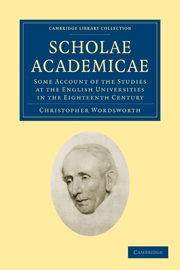 Scholae Academicae
Scholae Academicae Book contents
- Frontmatter
- PREFACE
- Contents
- CHAPTER I GENERAL INTRODUCTION
- CHAPTER II THE TRIPOS, name and thing
- CHAPTER III THE SOPHS' SCHOOLS before 1765
- CHAPTER IV ACTS AND OPPONENCIES after 1772
- CHAPTER V THE SENATE-HOUSE
- CHAPTER VI THE ADMISSION OF QUESTIONISTS. Huddling
- CHAPTER VII THE MATHEMATICKS
- CHAPTER VIII THE TRIVIAL ARTS
- CHAPTER IX HUMANITY
- CHAPTER X MORALS AND CASUISTRY
- CHAPTER XI LAW
- CHAPTER XII MODERN STUDIES
- CHAPTER XIII ORIENTAL STUDIES
- CHAPTER XIV PHYSICK
- CHAPTER XV ANATOMY
- CHAPTER XVI CHEMISTRY
- CHAPTER XVII GEOLOGY AND MINERALOGY
- CHAPTER XVIII BOTANY
- CHAPTER XIX The Degree of M.A.
- CHAPTER XX MUSICK
- CHAPTER XXI ASTRONOMY
- CHAPTER XXII CONCLUSION
- APPENDICES
- INDEX
CHAPTER VII - THE MATHEMATICKS
Published online by Cambridge University Press: 07 September 2010
- Frontmatter
- PREFACE
- Contents
- CHAPTER I GENERAL INTRODUCTION
- CHAPTER II THE TRIPOS, name and thing
- CHAPTER III THE SOPHS' SCHOOLS before 1765
- CHAPTER IV ACTS AND OPPONENCIES after 1772
- CHAPTER V THE SENATE-HOUSE
- CHAPTER VI THE ADMISSION OF QUESTIONISTS. Huddling
- CHAPTER VII THE MATHEMATICKS
- CHAPTER VIII THE TRIVIAL ARTS
- CHAPTER IX HUMANITY
- CHAPTER X MORALS AND CASUISTRY
- CHAPTER XI LAW
- CHAPTER XII MODERN STUDIES
- CHAPTER XIII ORIENTAL STUDIES
- CHAPTER XIV PHYSICK
- CHAPTER XV ANATOMY
- CHAPTER XVI CHEMISTRY
- CHAPTER XVII GEOLOGY AND MINERALOGY
- CHAPTER XVIII BOTANY
- CHAPTER XIX The Degree of M.A.
- CHAPTER XX MUSICK
- CHAPTER XXI ASTRONOMY
- CHAPTER XXII CONCLUSION
- APPENDICES
- INDEX
Summary
‘There is figures in all things.’
K. Henry V. Act vi. Sc. 7.A university speech made probably in the year 1654 by Isaac Barrow (who a few years later had the singular fortune to be predecessor of Newton as Lucasian professor, of Bentley as. master of Trinity, and of Porson as Greek professor) will give the reader a notion of the progress of Cambridge mathematics previous to the appearance of Newton.
‘Nempe Euclidis, Archimedis, Ptolemaei, Diophanti, horrida olim nomina iam multi e uobis non tremulis auribus excipiunt. Quid memorem iam uos didicisse arithmeticae ope, facili et instantanea opera uel arenarum enormes numeros accurate computare’ &c.—After referring to astronomical studies, he continues—‘Sane de horribili monstro, quod Algebram nuncupant, domito et profligate multi e uobis fortes uiri triumpharunt: permulti ausi sunt Opticem directo obtutu inspicere; alii subtiliorem Dioptrices et utilissimam doctrinam irrefracto ingenii radio penetrare. Nee uobis hodie adeo mirabile est, Catoptrices principia et leges Mechanicae non ignorantibus, quo artificio magnus Archimedes romanas naues comburere potuit, nee a tot saeculis immobilem Vestam quomodo stantem terrain concutere potuisset.’
And, to speak the truth, this was a matter of congratulation for seventeenth-century Cambridge. For while we are not content that it should now be considered as exclusively ‘the mathematical university,’ or that the tripos in the last century should be called ‘the mathematical tripos,’ it appears that about 1635 it was not mathematical at all.
- Type
- Chapter
- Information
- Scholae AcademicaeSome Account of the Studies at the English Universities in the Eighteenth Century, pp. 64 - 81Publisher: Cambridge University PressPrint publication year: 2009First published in: 1877


